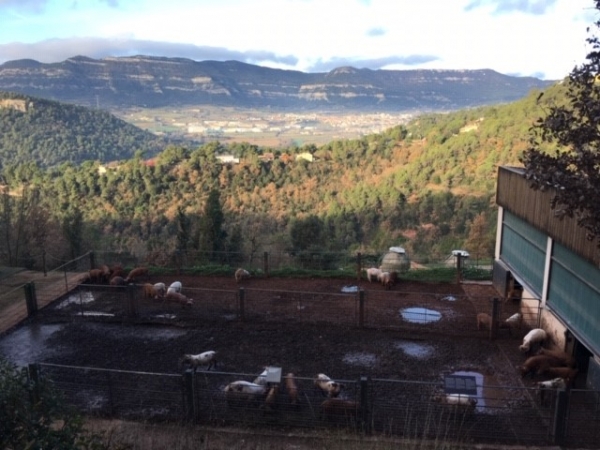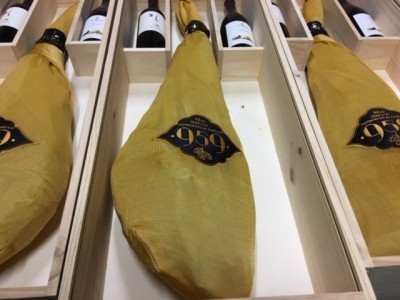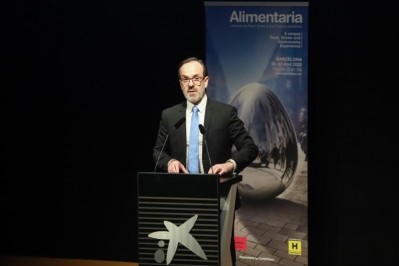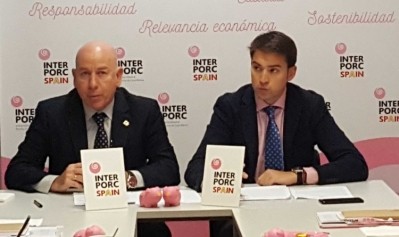Salgot on the challenges of running an organic pig farm in Spain
Established in 1928, the family-run farm, was passed down the generations from their grandfather Antoni Salgot, to their father, Pere. The organic farm and research centre is testamount to the owners, who are the founding members of the Gourmet Cluster of Catalonia, and the fact they wanted to stand out from the competition to run a business as sustainably as possible.
Gourmet Cluster of Cataloni
The facility houses 130 pigs and processes cured, cooked and fresh cold meats with traditional or organic ingredients.
Valeri said the Vic Plain and the Montseny Natural Park provides clean air, a surrounding forest and the space to care for their animals and the farm stands at the site of an old reforested quarry, which is now a Biosphere Reserve.
“We have designed the structure and layout of the buildings so that the animals can enjoy direct sunlight and live comfortably during each phase of the breeding phase. We have also made the building sustainable in terms of waste management, water use and recycling and power generation using biomass and solar panels,” he said.
The pigs that live at the organic farm only eat organic ingredients sourced nearby including cereals, vegetables and olive oil.
In Spain, about 44 million cured hams are produced annually, of which about 6 million are Ibérico, 16 million are Serrano and 22 million are cured white pork, according to AGRIPA.org
Only those which comply with Especialidad Tradicional Garantizada (ETG, Guaranteed Traditional Speciality) regulations can be called Serrano. Iberian ham production is protected by four Designations of Origin (D.O.): Cerdo Ibérico, Guijuelo de Huelva, Los Pedroches and Dehesa de Extremadura.
White pork
Spanish pork products are divided in two main categories depending on the race they come from. The majority is white pork, from which ham, cold meats, and cold cuts are made. The rest comes from the Ibérico race, indigenous to the Iberian Peninsula.
In recent years acorn-fed Ibérico ham has positioned itself alongside delicatessen products in the world. It is made from Ibérico free-range pigs.
Meat is by far the most consumed food in Spain. Spanish livestock is the second in the EU in terms of numbers, and the meat industry is the fourth most important sector in Spain after cars, petrol and energy (source: AGRIPA). However some environmentalists have raised concerns over the strain pig farming places on drought-prone areas of Spain.
The vision of free-range pigs happily roaming across Spain’s landscape is in stark contrast with the fact the majority of pork products comes from factory-farmed animals.
“We export to Germany and across Spain but the problem we have today is the cost,” said Valeri.
“We created the organic pig farm to become more sustainable but the challenge is the price point. People want organic but traditional pork products are cheaper. We are trying to differentiate ourselves from the competition by being organic, which isn’t common here in this part of Spain. The problem is people want to consume organic but they don’t always want to pay the price so that’s why our farm still sells both, but we are trying to adopt this philosophy.”
Pig farming in Spain has steadily grown in the past decades to become the powerful industry it is today. Whilst in 1954 there were approximately nine refrigerated slaughterhouses and 615 cold meat factories, today there are almost 700 slaughterhouses, 2,400 cutting plants, and over 5,000 processing establishments.
China
A report produced for the Environment Ministry revealed in 2017, the number of pigs slaughtered for pork products exceeded 50 million, 3.5 million more than the 46.5 million human population of Spain
Spain has seen a surge in pork production over the last five years to meet a growing export demand from China, the report found.
Its weight in the economy is considerable: with a business of €21,164m it accounts for 20% of the food industry and brings 2% of GDP.
The meat industry is the number one exporter of Spain’s food and agriculture industry, ahead of wine exports and international demand is on the increase.
For more information about food and drink in Spain visit Alimentaria 2020, in Barcelona, April 20-23.










